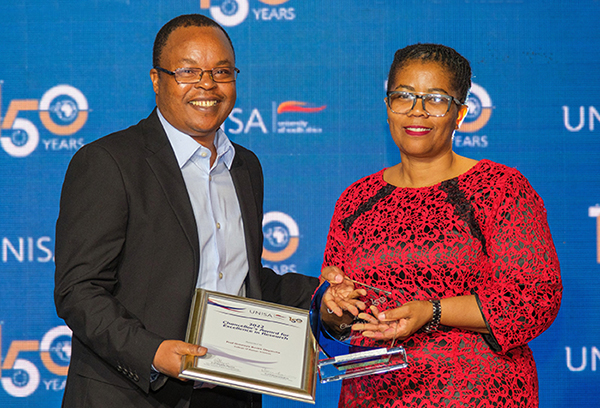
The African college of excellence in the social and human sciences
"I am deeply honoured to have received the Chancellor's Award for Excellence in Research and am grateful for the recognition of my research work in the broad field of information science," says Prof Omwoyo Bosire Onyancha in humility.

Prof Omwoyo Bosire Onyancha (Recipient of the Chancellor's Award for Excellence in Research) and Prof Puleng LenkaBula (Unisa's Principal and Vice-Chancellor)
Onyancha is an exceptional researcher and is one of six who received what is regarded as the most prestigious award for research at Unisa during the 2023 Research and Innovation Awards. The Chancellor's Award for Excellence in Research recognises high-quality published research by permanent Unisa researchers and research groups.
Onyancha is a research professor in the Department of Information Science in the College of Human Sciences. His research focus is domiciled in Library and Information Science (LIS).
"My interest in knowledge mobilisation, utilisation of research, evaluation of research performance and scientometrics/informetrics was sparked when my academic supervisor pointed out its potential significance in decision-making and policy formulation," he says.
These topics have since captivated his attention, and he has been continuously learning and researching in these research areas to explore their potential impact further.
His research studies have provided insights into the impact of information and communication technologies in information processing and use, the role of metadata in information retrieval, and the importance of knowledge management in organisational performance.
With over 154 journal articles, 11 book chapters and 2 edited books to his name, Onyancha has significantly contributed to developing his discipline and cognate disciplines.
His work in LIS research aims to improve access to information, support education and lifelong learning, enhance cultural heritage and preservation, and solve information-related societal challenges.
"In terms of knowledge mobilisation, my research focuses on improving the transfer of knowledge from researchers to practitioners and policymakers," he says.
The utilisation of research is another critical area of LIS research. Its objective is to ensure that research is conducted and used by stakeholders for decision making. It aims to develop strategies for promoting the use of research evidence in policymaking and a strategy for increasing the uptake of research findings by practitioners and the general public.
The evaluation of research performance involves assessing the impact of research on society, which helps identify areas where research has significantly impacted and areas that require further research.
LIS research in this area focuses on developing metrics for evaluating research performance and identifying the factors that influence research impact.
Onyancha says scientometrics is another critical area of LIS research that aims to provide insights into the patterns of research production and impact. It involves analysing the structure of the scientific community, including collaboration patterns, citation analysis, and network analysis, among others.
The insights provided by scientometrics are used to inform policy decisions related to research funding and to improve the effectiveness of knowledge dissemination.
#Unisa150
* By Mpho Moloele, PR and Communications, Department of Research, Innovation and Commercialisation
Publish date: 2023-10-09 00:00:00.0